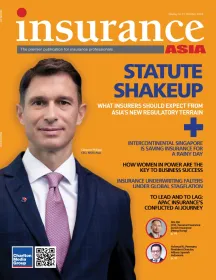Global economic slowdown fueled by increased interest rates from major banks
Asia Pacific's insurance premiums are expected to climb 2.3%. In the next two years.
The global economy is poised for a slowdown in 2024 and 2025, primarily due to the substantial interest rate increases implemented by major central banks worldwide, John Zhu, Chief Economist at Swiss Re Institute in Asia, predicted.
Zhu emphasized that the lagged impact of these rate hikes was initiated by institutions like the US Federal Reserve, the European Central Bank, and the Bank of England.
“This is inevitably going to cause a slowdown, and that's what it's designed to do. It is going to create an economic slowdown so that inflation will come back to Central Bank targets,” Zhu explained.
This deliberate move aimed at curbing inflation, according to Zhu, is set to have significant ramifications for the global economy.
He said that the insurance industry should not become complacent even though headline Consumer Price Index (CPI) figures are expected to fall next year. He pointed out that claims inflation, driven by services or labor costs, may remain persistent.
“A lot of the disinflation in CPI is due to lower commodity prices. But for a lot of insurers, the claims inflation that they see is driven by services or labor costs,” Zhu noted.
In the Asia Pacific region, insurance premiums are expected to increase 2.3% over the next two years. Zhu attributed this growth to the region's robust economic performance, contrasting the slowdown anticipated in the US and Euro area.
He stated, “We expect the APAC region to once again be the main source of growth for the global economy for global GDP.
Specifically, in the property and casualty insurance sector, a global premium growth of 3.4% is anticipated in 2023. Zhu highlighted that this growth is partly driven by hard market conditions that are expected to continue into 2024.
He elaborated, “Some of the losses we’ve seen in prior years, for example, from natural catastrophes, still require some repricing of the risks and updating of assumptions and models.”
Furthermore, Zhu pointed out the compounded impact of post-COVID inflation, which has escalated the cost of replacements in areas like property damage or motor insurance. This necessitated a continued and necessary repricing of risks in the insurance market.



















 Advertise
Advertise


